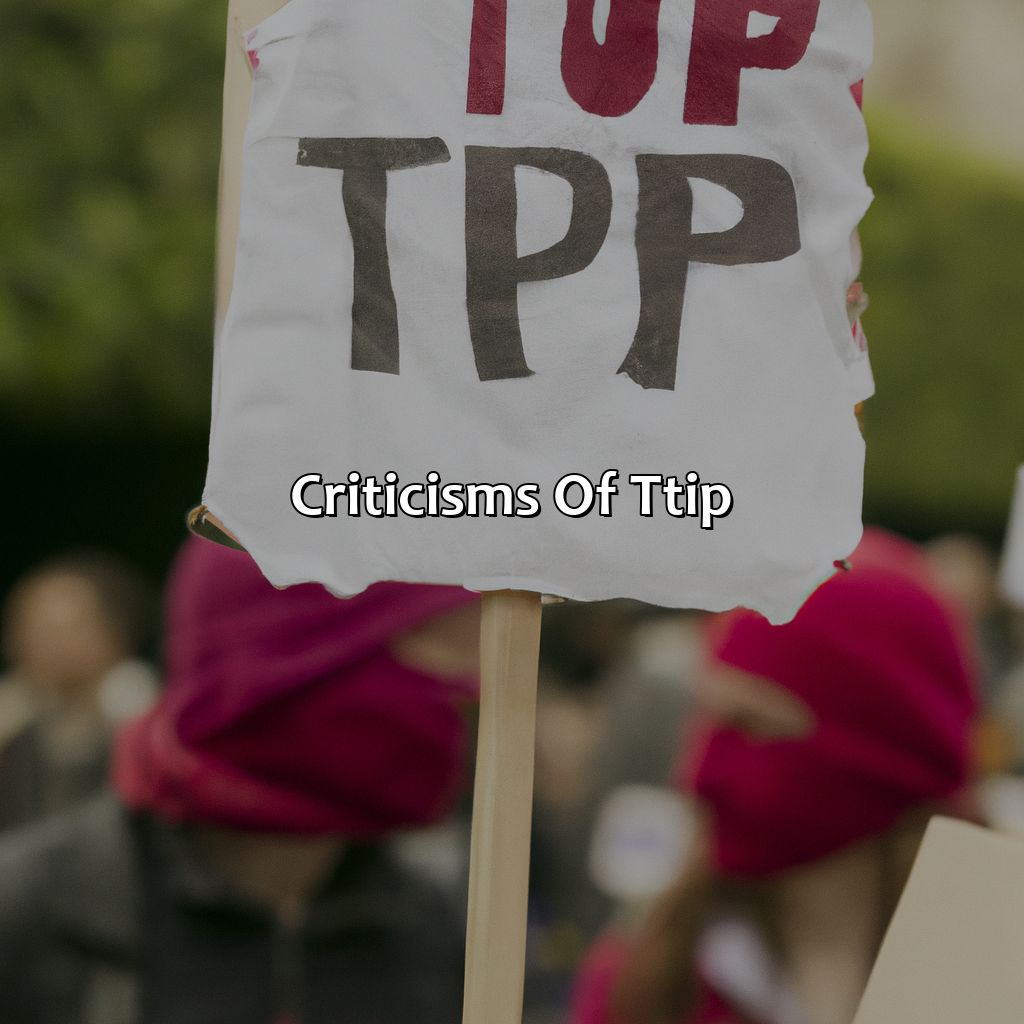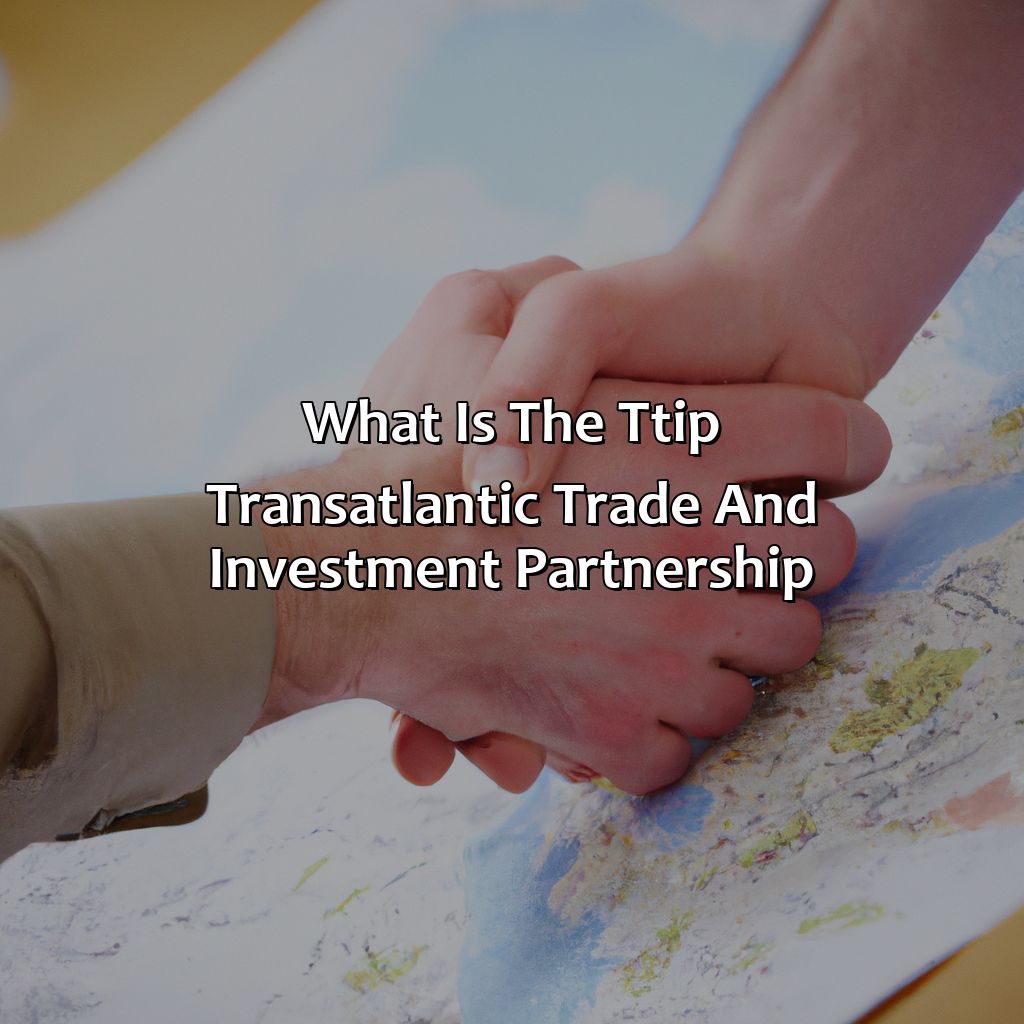What Is The Ttip (Trans-Atlantic Trade And Investment Partnership)?
Key Takeaway:
- The TTIP, or Trans-Atlantic Trade and Investment Partnership, is a proposed trade agreement between the United States and European Union aimed at reducing trade barriers and increasing economic cooperation.
- The purpose of TTIP is to create jobs, promote economic growth, and strengthen the global economic system by eliminating tariffs, simplifying regulations, and improving intellectual property protection.
- The benefits of TTIP include increased trade and economic opportunities, improved political cooperation and stability, and enhanced access to goods and services for consumers. However, there are concerns about the potential environmental and health impacts, as well as loss of sovereignty for participating countries.
Are you lost when it comes to the TTIP? This article is here to provide an explanation of the crucial trade partnership and discuss its potential impacts. You’ll understand why the TTIP is important, and be better informed to make your own decisions about it.
What is TTIP?
Grasping the concept of TTIP? First, you need insights into its purpose and the parties involved. So, take a closer peek! What’s the purpose of TTIP? Who’s negotiating? With this knowledge, you’ll gain a greater understanding of this critical agreement.

Image credits: retiregenz.com by James Arnold
The purpose of TTIP
TTIP is a trade agreement between the United States and the European Union. It aims to eliminate barriers to trade and investment in various economic sectors, including agriculture, intellectual property, and services. The purpose of TTIP is to increase transatlantic competitiveness and economic growth by developing a more integrated world economy. This would be achieved by opening markets, reducing regulatory burdens, promoting innovation, and creating jobs.
One of the primary goals of TTIP is to reduce tariffs on goods traded between the US and EU countries. By doing so, it will make imports cheaper for consumers, boosting trade between these two regions. Besides that, TTIP aims to establish common regulatory standards across different sectors such as product safety or data protection standards. These measures are intended to lower costs for businesses in both regions while also maintaining high safety standards.
TTIP can boost exports from both sides through increased access to each other’s markets. US companies could benefit from better access to EU markets while European companies could sell more goods in the United States.
Infrastructure development and investment opportunities are also essential features of TTIP. Increasing investment opportunities for businesses would lead to job creation and economic growth on both sides of the Atlantic.
The TTIP negotiations are like a blind date, except the parties involved are governments and corporations trying to screw each other over.
The negotiating parties
The entities involved in the negotiation of the Trans-Atlantic Trade and Investment Partnership include the United States, represented by its government, and the European Union including its member states. The negotiations aim to create an extensive trade agreement that covers various commercial sectors and eases investment procedures.
The negotiating parties are keen on removing trade barriers such as export tariffs and regulatory obstacles while ensuring standards remain high. The agreement will cover a wide range of industries from agriculture to energy, digital services to transportation, among others. With the agreement’s implementation, businesses will have an easier time investing in foreign countries without worrying about red tape.
One significant advantage of this partnership is enhanced access to markets in both Europe and America for businesses. As a result, TTIP can stimulate economic growth, increase employment opportunities and reduce consumer spending by bringing down prices for imported goods.
Pro Tip: While negotiations continue between these parties with agreements yet to crystallize, it is important to stay informed on any developments as they could impact specific industries.
TTIP may take away your job, but hey, at least you’ll have cheaper jeans to wear to your unemployment line.
Benefits of TTIP
Let’s explore the advantages of the Trans-Atlantic Trade and Investment Partnership (TTIP)! Dive in and discover the economic and political benefits this treaty offers. We’ll look more into these two sections in the next paragraphs.

Image credits: retiregenz.com by Joel Woodhock
Economic benefits
The potential economic advantages of the proposed Trans-Atlantic Trade and Investment Partnership (TTIP) are numerous. The agreement aims to remove tariffs and other trade barriers between the United States and Europe, which would create a massive market with more than 800 million consumers, accounting for almost half of global GDP.
This would make it easier and cheaper for businesses to trade across the Atlantic, which could lead to higher sales and profits for companies on both sides of the ocean. It could also boost competition, leading to improved quality and lower prices for consumers.
Another key benefit of the TTIP is that it could help establish common regulations and standards across the US and Europe. This would make it simpler for businesses to navigate regulatory requirements when exporting their products or services across borders.
Furthermore, as part of the agreement, intellectual property rights and access to public procurement opportunities may be expanded – giving businesses increased legal protection over their IP assets along with greater bidding opportunities in both regions.
Interestingly, this isn’t the first attempt at such an agreement between these two large economies. The Transatlantic Economic Council was established in 2007 through a joint European Union-United States initiative aimed at advancing transatlantic economic cooperation but negotiations on establishing an integrated market ground to a halt in 2013 due to disagreements on topics from food safety regulations to cybersecurity coupled with European scepticism towards foreign investment protections.
TTIP is like that unexpected friendship between two politicians, it may have its flaws but at least there’s some benefit to it.
Political benefits
TTIP brings significant Political advantages by facilitating enhanced collaboration, improved regulatory coherence, increased transparency and cooperation between the US and EU. It also promotes global governance standards and supports multilateral trade organizations to create fair competition in the international market. Such benefits can foster trustful relationships between nations and strengthen long-term prosperity. Additionally, TTIP reinforces democratic principles as it allows civilized negotiation processes with mutual respect for each party’s legal frameworks, reducing policy barriers to trade or investment. Overall, TTIP encourages political stability and alignment across regions while mutually benefiting both parties through sustainable growth.
TTIP: bringing the US and EU closer together by ignoring public opinion and crushing small businesses since 2013.
Criticisms of TTIP
To make sense of the critiques of TTIP, learn about the worries about the environment and health, as well as the chance of losing sovereignty. These sub-sections give us a glimpse of the key unfavorable effects of TTIP, leaving us uncertain about its efficiency and ethical effects.

Image credits: retiregenz.com by David Jones
Environmental and health concerns
The proposed Trans-Atlantic Trade and Investment Partnership (TTIP) has raised concerns about its potential environmental and health impacts. Critics argue that the agreement could weaken existing regulations, allowing for the importation of products with lower standards of safety and quality. The potential risks include exposure to harmful chemicals, lower food safety standards, and decreased access to affordable healthcare.
In addition to impacting public health, the TTIP could harm the environment by reducing government regulatory powers and opening up natural resources to exploitation by multinational corporations. Increased industrial activity associated with the agreement could result in air pollution, water contamination, and other forms of environmental degradation.
It is worth noting that opponents of the TTIP have also criticized its lack of transparency and public participation in negotiations. This has led to concerns that corporate interests may be prioritized over public welfare in decision-making processes related to trade and investment.
Despite these criticisms, supporters of the TTIP argue that it will boost economic growth by eliminating tariffs on goods traded between Europe and North America. However, opponents claim that any potential economic benefits are outweighed by the potentially devastating effects on public health and the environment.
The history of international trade agreements highlights how difficult it can be to balance economic interests with concerns for public welfare and environmental sustainability. In light of these challenges, it is important for policymakers and advocacy groups alike to consider a range of perspectives when evaluating proposals like the TTIP.
“They say losing sovereignty is like losing your virginity – once it’s gone, you can never get it back. So why are we so eager to give it up for the TTIP?”
Loss of sovereignty
TTIP (Trans-Atlantic Trade and Investment Partnership) has been criticized for its potential to undermine the sovereignty of participating countries. This concern arises from the fact that the partnership seeks to create a single market with unified regulations, which could limit the ability of governments to make autonomous decisions on issues such as health and safety standards, environmental protections, and consumer rights.
Furthermore, opponents have argued that TTIP would enable corporations to sue national governments in secret courts if they perceive their investments or profits have been adversely affected by legislative changes. This provision could lead to a situation where corporations hold significant power over governments, further eroding sovereignty.
It is important to note that the European Union (EU) has sought to address some of these concerns by proposing an Investment Court System that would replace traditional investor-state dispute settlement mechanisms. However, there are still concerns about the extent to which sovereignty will be compromised under TTIP.
A true history relays that TTIP negotiations were launched in 2013 by President Barack Obama and Chancellor Angela Merkel as part of a broader effort to strengthen economic ties between North America and Europe. While the agreement was expected to be finalized by 2015, discussions stalled amid increasing public opposition and concerns around transparency and democratic accountability in the negotiation process.
Five Facts About the TTIP (Trans-Atlantic Trade and Investment Partnership):
- ✅ The TTIP is a proposed trade agreement between the EU and the US that aims to remove trade barriers and promote economic growth. (Source: European Commission)
- ✅ Negotiations for the TTIP began in 2013 but were put on hold in 2016 due to public concerns about transparency and potential impacts on industries and standards. (Source: BBC)
- ✅ Proponents of the TTIP argue that it could lead to increased job creation, GDP growth, and consumer benefits such as lower prices and greater choice. (Source: European Commission)
- ✅ Critics of the TTIP have raised concerns about potential negative impacts on food safety, environmental regulations, privacy, and democracy. (Source: Friends of the Earth Europe)
- ✅ The TTIP has not been ratified, and its future remains uncertain as the US and EU have shifted their focus to other priorities. (Source: The Guardian)
FAQs about What Is The Ttip (Trans-Atlantic Trade And Investment Partnership)?
What is the TTIP (Trans-Atlantic Trade and Investment Partnership)?
The TTIP is a proposed trade agreement between the United States and the European Union (EU) that aims to reduce barriers to trade and investment between the two regions. The negotiations for this agreement started in 2013 and have been controversial due to concerns about its potential impact on various sectors.
What are the main goals of the TTIP?
The main goals of the TTIP are to stimulate economic growth, create jobs, and enhance trade and investment between the United States and the European Union. The agreement aims to eliminate tariffs and reduce non-tariff barriers to trade, such as differences in regulations and standards.
What are the potential benefits of the TTIP?
Proponents of the TTIP argue that it will lead to increased trade and investment, lower prices for consumers, and greater economic growth. The agreement could also make it easier for businesses to operate in both regions, and create jobs by boosting trade and investment.
What are the potential drawbacks of the TTIP?
Opponents of the TTIP have raised concerns about the agreement’s potential impact on sectors such as agriculture, public services, and the environment. They also worry that the agreement could lead to a loss of sovereignty and undermine important consumer protections and regulations.
Is the TTIP still being negotiated?
As of 2021, the negotiations for the TTIP have been on hold since 2016. The EU and the US have been working on a similar agreement called the Comprehensive Economic and Trade Agreement (CETA), which was negotiated between Canada and the EU.
How can I find more information about the TTIP?
You can find more information about the TTIP by visiting the official websites of the European Commission and the United States Trade Representative. Additionally, many news outlets and think tanks have published articles and reports about the agreement and its potential impact.
